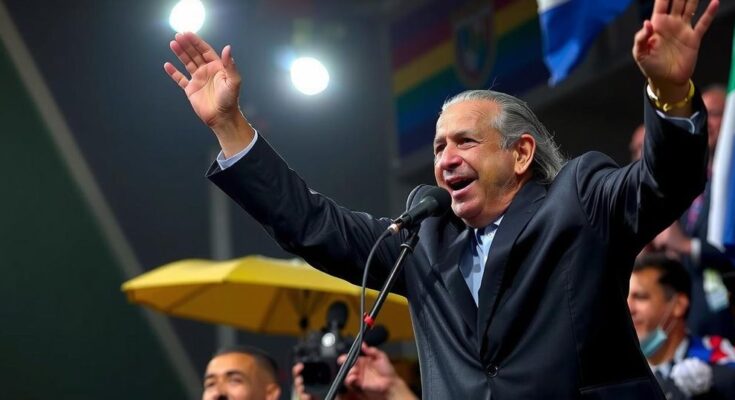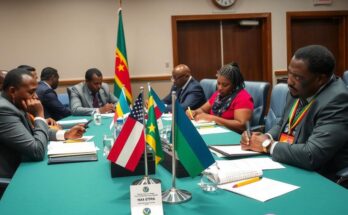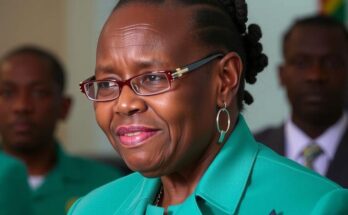Yamandú Orsi has won the presidency of Uruguay, marking a shift back to left-wing governance after five years of conservative rule. His election readies a dialogue-driven approach to tackle crime and economic recovery while benefiting from support from key figures like former president José Mujica.
On November 24, left-wing candidate Yamandú Orsi secured the presidency of Uruguay, reflecting a voter preference for a change after five years of conservative leadership. In a closely contested election runoff against Álvaro Delgado from the National Party, Orsi received 1,123,420 votes compared to Delgado’s 1,042,001. Orsi, representing the Frente Amplio (Broad Front) alliance, emphasized the importance of national dialogue and committed to addressing crime associated with drug trafficking and fostering economic growth.
The election marks a significant shift in Uruguay’s political landscape, as Orsi returns the presidency to the leftist coalition that previously held power for 15 years until 2020. His victory speech underscored a commitment to finding balanced and rational solutions amid prevailing concerns about security and economic stability. Despite the political shift, analysts suggest that Orsi’s policies are unlikely to enact radical changes to Uruguay’s economic direction, as he had indicated during his campaign.
Yamandú Orsi emerged as the frontrunner with 43.9% of the votes in the initial round on October 27, ultimately leading to a two-candidate scenario against Delgado, who garnered 26.7%. This transition follows a period marked by dissatisfaction with rising crime rates and drug-related issues under the previous center-right administration. In the upcoming legislative session, Orsi will operate with a Senate majority while navigating a minority status in the Chamber of Representatives.
The electoral results triggered celebrations in Montevideo, a key stronghold for the Frente Amplio. Orsi’s campaign benefitted from the backing of former president José Mujica, a beloved figure known for his humble approach to governance. Mujica, reflecting on his legacy and the future of Uruguay’s youth, stated: “Personally, I have nothing more to look forward to… But I am interested in the fate of you, the young people who, when they are my age, will live in a very different world.” The new administration will have the challenge of addressing ongoing security concerns while building upon economic recovery efforts bolstered by a stable democratic framework in Uruguay.
Yamandú Orsi’s election victory on November 24 signals a return to leftist governance in Uruguay after a five-year conservative rule led by the National Party. His party, the Frente Amplio, previously held power in the country for three consecutive terms, implementing progressive reforms including the legalization of abortion and same-sex marriage. The electoral backdrop includes rising crime and public concerns about security, which influenced the recent electoral campaigns. With compulsory voting in Uruguay, the electorate significantly engages in the democratic process, highlighting its status as one of Latin America’s most stable democracies.
Yamandú Orsi’s election as president of Uruguay marks a significant political shift back to leftist governance following a five-year span of conservative rule. As he prepares to lead, Orsi aims to address pressing concerns around crime and economic recovery while fostering dialogue among all sectors. His leadership, supported by the legacy of former president José Mujica, reflects the electorate’s desire for renewed hope and solutions to longstanding societal issues.
Original Source: www.lemonde.fr




